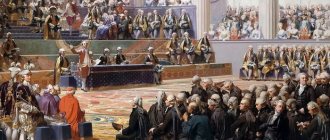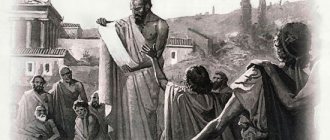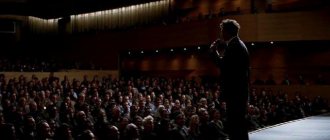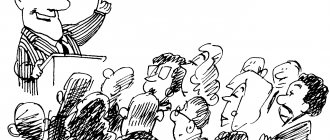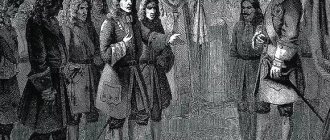The Origin of Rhetorical Art
Modern oratory has retained the features that defined it in ancient times. These roots must be sought in antiquity, where rhetorical science began. The art of eloquence originated in Greece in the 5th-4th centuries BC. e., on the site of modern Sicily. This period coincided with the heyday of Athenian democracy. The People's Assembly and the Court, the Council of Five Hundred began to play an important role in the life of the state: courts were held, political issues were decided publicly. A free citizen needs eloquence to conduct business, build a career, and defend rights.
Rhetoric in ancient Greece as a science arose around 460 BC. e., its formation at this time is associated with the Sophists:
- Corax (467 BC) - political orator, became the first author of a treatise on rhetoric and the founder of a school that taught the art of eloquence.
- Tisias (480 BC) - the founder of ancient rhetoric, wrote and published a work on the art of persuasion, and was the first to introduce the structure of oratorical speech: what to say at the beginning and in the middle, how to end a speech.
- Protagoras (481–411 BC) - gained fame as a result of his teaching work, traveled around the world, introduced a dialogue form of communication, inviting his interlocutors to defend and defend their own beliefs.
- Lysias (443 BC) - an ancient Greek orator who laid the foundations of judicial eloquence, created a kind of standard of style, which was followed by subsequent generations of rhetoricians.
- Gorgias (483 BC) - the founder of sophistry, teacher of eloquence in Athens, developed techniques for decorating speech, which were called “Gorgian figures.”
The ideology of the Sophists had a number of features:
- The main thing is manipulation of the audience.
- The basis of sophistic rhetoric is an argument, a verbal competition in which one wins and the other loses.
- The sophists did not seek truth in the dispute, they needed victory, so it is not the content of the speech that is important, but its “external form.”
Not all contemporaries of the sophists shared this teaching, considering the latter’s techniques to be intellectual fraud. However, the sophists helped rhetoric become one of the compulsory sciences for educating citizens.
What does science study?
The subject of rhetoric, as a science, includes methods of forming useful oral and written speech, as well as the process by which thoughts are transformed into speech.
In order to determine the tasks of rhetoric, it is necessary to know about its main directions. There are two of them:
- Logical, in which the main aspects are the ability to convince the listener and effectively present information.
- Literary, in which the most important elements are the richness and attractiveness of words.
Taking into account the fact that in this science these directions are combined, real rhetoric sets itself the task of making speech correct, convincing and expedient. Having defined what rhetoric is and why it is needed, there is no doubt about its necessity in the life of a person, especially those engaged in public activities.
Socrates and Plato - discoverers of new ways of oratory
Socrates (born around 470 BC) is known for opposing the sophistic ideals of rhetoric. He believed: the sophists, with their sophistication in evidence, confuse the public. According to the philosopher, the main point of true eloquence should be finding the truth, and not the skill of the speaker, who is able to convince listeners of anything. This idea was later expounded by Plato (a student of Socrates), which can be read in the work Phaedrus.
Socrates did a lot to develop the dialogue form of conversation; his teaching was always focused on the correct construction of speech:
- introduction;
- presentation of the material;
- evidence of what was said;
- conclusions on the topic (plausible).
Socrates wondered about philosophical problems about the meaning of human existence. He believed that dialogue is conducted not for fun and idle matters, but to find the truth. Socrates' rhetoric can be viewed from a moral perspective.
Plato (427 BC) emphasized the emotional persuasion of the speaker, believing that eloquence should touch the deepest chords of the listener's soul. He said that every speaker should have his own path to finding the truth, there is no need to rely on other people's thoughts and experiences.
Aristotle and his significance in the development of rhetoric as a science
Ancient rhetoric cannot be imagined without the name of Aristotle (384–322 BC), who developed and generalized everything that the orators of Greece were able to achieve. He is the author of the treatise “Rhetoric”, which included 3 books:
- 1 – tells what place rhetoric occupies in the system of ancient sciences, what types of speeches it is represented by;
- 2 – describes ways to persuade listeners;
- 3 – studies the issues of style and structure of speech.
The philosopher clearly separated fiction from rhetoric; he dedicated the treatise “Poetics” to the first. This teaching examines the theory of drama. In the first part, the philosopher characterizes the term “poetics”. Here you can read how he talks about the essence of art, believing that it helps people understand life. While Plato and Socrates did not attach cognitive functions to rhetoric. "Poetics" sums up all existing literary theories. The work is written in simple and specific language. The treatise "Poetics" expressed Aristotle's theory of poetry, and in "Rhetoric" the theory of artistic prose was formulated. The works “Poetics” and “Rhetoric” also influenced the development of philosophy.
Aristotle managed to complete the transformation of oratory into a science. His teaching highlights a chain that was subsequently developed in the works of other researchers:
- 1 – speech sender;
- 2 – speech;
- 3 – speech recipient.
Aristotle believed that the persuasiveness of a rhetorician directly depends on his morality. But the quality of speech and the mood of the audience also matter. In his works, the philosopher analyzes the types of listeners, saying that the speaker should rely on their individual characteristics. For example, when creating a future speech, consider the age of the potential audience. Aristotle opposed the manipulation of people; the goal of the speaker, on the contrary, should be to encourage listeners to think.
The ultimate goal of conversation is the acquired truth, Aristotle believed. But in no case should you try to achieve victory in different ways; it is much better to join forces to reach agreement. Aristotle became the figure whose activities influenced the further formation of the art of orators. It is ancient rhetoric that develops the basic principles of science.
What is teaching?
What does the word "rhetoric" mean? Translated from Greek, the word rhetoric looks like “rhetorike” and means “oratory.” Initially, this definition implied the ability to speak beautifully and express one’s thoughts in front of other people.
Over time, the concept of rhetoric changed several times, which was influenced by changing periods of people’s cultural development. Therefore, this science, from antiquity to the present time, was perceived differently.
It was founded by the sophists, who said that rhetoric is a discipline that can teach a speaker to prove his position, manipulate and dominate discussions. In modern times, the basis of such a science is harmonizing speech, the search for truth, and stimulation of thought.
Now the word rhetoric is understood as a discipline that allows you to study methods of forming speech, characterized by expediency, harmony, and the ability to influence. In this regard, the subject of rhetoric acts as a mental-speech action. Rhetoric combines the teachings of philosophy, sociology, and psychology, which helps to achieve effective verbal interaction with any public.
Thus, modern rhetoric is considered from three sides:
- This is a science that examines the art of speech, which has specific standards for public speaking in front of people, allowing one to achieve a good result when influencing listeners.
- This is the highest level of skill in delivering a speech in front of an audience, mastery of words at a professional level and excellent oratory.
- An academic discipline that helps students instill the rules of public speaking.
Thus, general rhetoric studies the rules for constructing expedient and persuasive speech, which helps make the speech vivid and memorable.
Rhetoric of Ancient Rome
The time of Hellenism became the next stage in the development of rhetoric. Greece lost its independence and Rome took over. However, the Romans quickly adopted the achievements of the Greeks in the field of culture.
The eloquence of the Romans reached its peak in the 1st century AD. e., this is the time when the role of the courts and the People's Assembly increased. The main person in the rhetoric of this era is Marcus Tullius Cicero (106–43 BC). He was a skilled orator who considered eloquence to be the main weapon in the hands of the state. This is the only way to influence the masses of people. Cicero's teachings are set out in the books he wrote:
- “About the speaker”;
- "Brutus" or "On Famous Orators";
- "Speaker";
- "On the best kind of speakers."
Marcus Tullius believed that a politician or social activist must be a skilled orator. And to become one, you must read and study a lot, have the makings of an actor and have a good memory. The rhetorician continued to develop the Greek classical ideal of how speech should be structured:
- First of all, the speaker should find something to say.
- The second is to arrange the material in strict order.
- Put it into words.
- Be sure to remember the material.
- To declaim the speech.
As the power of Rome increased, the essence of rhetoric changed. It was perceived not as the skill of good persuasion, but as the science of beautifully expressing thoughts. This approach was close to another Roman rhetorician, Marcus Fabius Quintilian (36–100 AD). He created the first public school of rhetoric and wrote a number of treatises on this science. His work became the final period of Roman rhetorical art.
The rhetoric of the ancient world played an important role in the life of Roman society. It was a means of public communication; it was taught to children in schools as a compulsory discipline. But the subsequent crisis of the Roman Empire affected eloquence - it became formal and meaningless.
Varieties of speaker speech
There are several types of oratory, depending on who needs to be convinced, where the speech takes place, and what purpose it pursues. These include the following eloquences:
- Social and political. This is when they read reports touching on social, political and economic topics, speak at rallies, and conduct campaigning.
- Academic. This includes reading lectures, scientific reports or communications.
- Judicial. This type of eloquence is used by the prosecutor and defense attorney when speaking in court. With their speech they must convince of the guilt or innocence of the accused person.
- Social and everyday life. It is used by all people when making speeches at anniversaries, feasts or funerals. This also includes small talk, which does not require disputes or discussions, but is characterized by ease and simplicity of perception.
- Bogoslovskoe. This eloquence is used in churches, for example, when believers give a sermon or other speech in a cathedral.
- Diplomatic. This type involves compliance with ethical standards in business speech. This is necessary during business negotiations, correspondence, when drawing up official documents, as well as during translation.
- Military. This type of eloquence is used when calling for battle, issuing orders, regulations, and transmitting information via radio communications.
- Pedagogical. This includes presentations by teachers and students, both oral and written. This also includes giving lectures, which is considered a complex act of pedagogical communication.
- Internal, or imaginary. This is the name of the dialogue that every person conducts with himself. This type involves mental preparation for oral presentation to the public, as well as for written transmission of information, when a person reads what is written to himself, remembers something, reflects on something, and so on.
Based on the above, we can conclude what rhetoric is and why society needs it. Rhetoric as the science of oratory involves the study of the correct pronunciation of speech in front of an audience in order to somehow influence the people listening to it. With its help, speakers acquire skills that allow them to make their speech correct, appropriate, and most importantly, convincing.
Development of rhetoric in the Middle Ages and the Renaissance
At the end of the 5th century, Rome fell, a feudal system was established, and rhetoric began to change. Church eloquence comes to the fore. It has instructive features. Rhetorical science in the Middle Ages has a number of characteristics:
- the need for the art of oratory decreases;
- Not everyone needs rhetoric, clergy and scientists need it;
- the loss of many traditions of ancient rhetoric, although some developments are used (in particular, Latin);
- serves as a decoration for the speeches of politicians and the speeches of preachers.
In the Middle Ages, rhetoric acquired the ability to influence a person’s mental consciousness. If a preacher possessed such a quality, his rhetorical skill was at its best. World-famous theologians orators grew up in the field of preaching eloquence: Basil the Great, Gregory the Theologian, John Chrysostom, Thomas Aquinas.
In the 11th–12th centuries, medieval universities appeared, and the university art of eloquence was formed. But it still depends heavily on the church.
A new rise in interest in rhetoric is noted during the Renaissance, at which time significant cultural changes occur. Interest in antiquity arose, Christianity ceased to be the leading ideology. With the development of the economy, trade eloquence is being revived, and parliamentary and judicial oratory is gaining popularity.
The rhetoric of the Renaissance is characterized by a departure from the Latin of old textbooks; ideas are increasingly heard to look for new opportunities in the native national language. The art of orators is moving closer to fiction. This is the period of the appearance of the first books on rhetoric, the opportunity to read in national languages. Among them:
- "The Garden of Eloquence" - Henry Peacham.
- “The Art of Poetry” - Nicolas Boileau.
- "The Art of English Poetry" - George Puttenham.
The Renaissance gave impetus to the emergence of new branches of eloquence, such as the rhetoric of conversation in secular society or the rhetoric of portraiture. The skillful orator, writer and philosopher of antiquity Cicero becomes a role model. The best minds of this time believe that learning a language is an indispensable condition for the equal development and growth of personality.
History of rhetoric in Russian culture
The Russian history of rhetoric has deep roots. In ancient times in Rus' there was no term “rhetoric”, but there was the concept of “eloquence”. It took different forms:
- Political eloquence had to be demonstrated at public meetings, veches or meetings of elders.
- Military oratory was used to inspire troops before battle.
- Diplomatic - agreements between warring parties.
- At feasts and funeral feasts, a solemn trend in the art of orators was born.
After the baptism of Rus', didactic rhetoric arose, which resulted in teaching and instructions, often for young people. These include “The Teachings of Vladimir Monomakh”, “The Life of Archpriest Avvakum”, “The Life of Sergei of Radonezh”. A noticeable mark in the history of ancient Russian rhetoric was left by the writer and preacher Kirill Turovsky. His legacy is an example of the art of orators, addressing parishioners in the form of instructions and sermons.
Despite the developed culture of eloquence, until the 12th century there was no educational literature on rhetoric in Rus'. Such a work appeared only in 1620 and included 2 books: “On the Invention of Things” and “On the Decoration of the Word.” The work presents the doctrine of science as a whole and examines the term “rhetorician” and the range of its “responsibilities.”
M. Lomonosov made an incommensurable contribution to the formation and development of Russian rhetoric. The scientist wrote two textbooks, where he described the history of rhetoric and analyzed ancient oratory. Lomonosov's rhetoric sets out the requirements and rules that the speaker must follow. The work was highly appreciated by contemporaries in the 18th century, they began to read it a lot, and later it became the basis for writing new textbooks.
Rhetoric in Russia was further formed thanks to outstanding scientists and teachers, public figures, including:
- Speransky M.M. (1772–1839) - wrote a course in literature (1792), the work sets out the norms and rules of speech for a speaker.
- Nikolsky A.S. (1755–1834) - in his works “Logic and Rhetoric” (1790) and “Foundations of Russian Literature” (1792), he examines prose, oratorical and poetic speech, and gives characteristics to each.
- Rizhsky I.S. (1755–1811) - created a 4-part essay “Rhetoric”; these works were the basis for teaching for many generations at universities.
The first half of the 19th century is the heyday of Russian rhetoric. Many works on science are being created, especially the works of famous scientists A.F. Merzlyakova, N.F. Koshansky, A.I. Galich, K.P. Zelensky.
The second half of the 19th century is the period of the emergence of a new discipline, “Theory of Literature,” which took on some concepts and sections of rhetoric. But rhetoric itself as an independent subject was gradually lost by the beginning of the 20th century.
